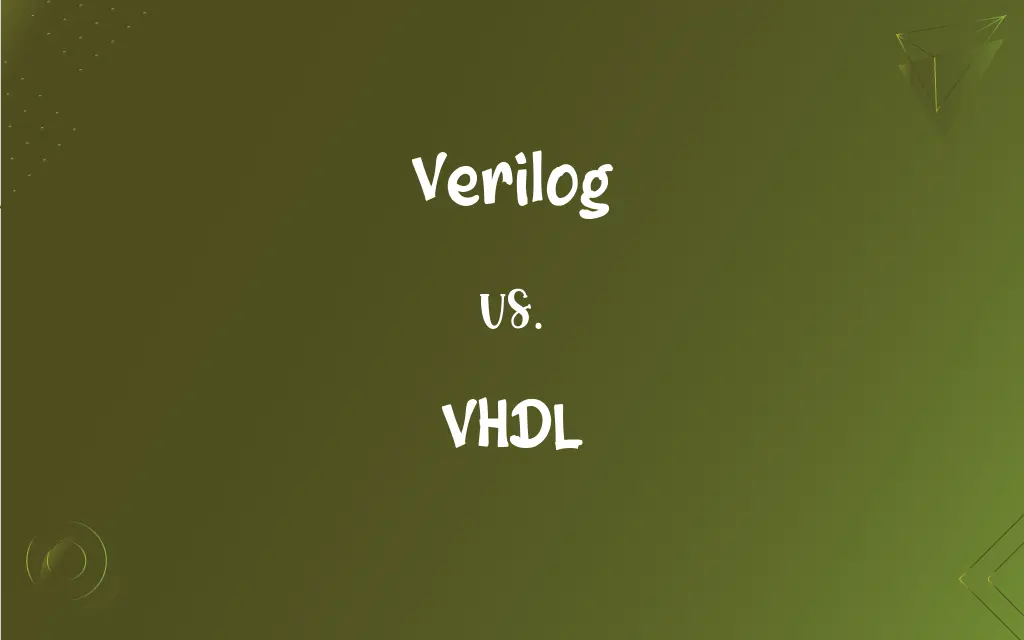Verilog vs. VHDL: What's the Difference?
Edited by Aimie Carlson || By Janet White || Published on February 17, 2024
Verilog is a hardware description language with C-like syntax for digital circuit design, while VHDL, with ADA-like syntax, is also used for defining digital and mixed-signal systems.

Key Differences
Verilog is a hardware description language (HDL) used primarily for modeling and designing electronic systems, particularly digital circuits, with a syntax resembling C programming. VHDL, which stands for VHSIC (Very High-Speed Integrated Circuits) Hardware Description Language, is another HDL used for the same purposes but with a syntax more akin to ADA, making it more verbose and strict.
Verilog is known for its simplicity and ease of learning, especially for those familiar with C programming, making it popular in quickly prototyping and simulating digital circuits. VHDL, in contrast, is characterized by its strong typing and extensive checking, which can reduce errors in complex designs but may result in a steeper learning curve.
In Verilog, designers often find it easier to write and understand code for complex digital systems due to its concise syntax. VHDL, however, offers more robustness and is preferred for larger projects where the rigor of design and error checking is crucial.
Verilog's popularity in the United States is notable, especially among startups and smaller companies due to its ease of use and quicker design cycle. VHDL, however, is more prevalent in Europe and in academic environments, where its structured approach aligns with engineering and research methodologies.
Both Verilog and VHDL are used in FPGA (Field-Programmable Gate Array) and ASIC (Application-Specific Integrated Circuit) design, but Verilog is often chosen for faster turnaround projects, while VHDL is selected for projects requiring meticulous design specifications.
ADVERTISEMENT
Comparison Chart
Syntax Style
C-like, concise
ADA-like, verbose
Learning Curve
Easier for those familiar with C
Steeper due to strict typing
Error Checking
Less rigorous
More extensive and strict
Popular Use
United States, startups
Europe, academia
Project Suitability
Quick prototyping, smaller projects
Large, complex projects
ADVERTISEMENT
Verilog and VHDL Definitions
Verilog
Verilog allows for easier modeling of complex digital systems.
Complex digital logic was efficiently modeled using Verilog.
VHDL
VHDL is known for its strong typing and extensive error checking.
The VHDL design process helped minimize errors in the final circuit.
Verilog
Verilog's syntax is similar to the C programming language.
Because of his background in C, he found Verilog intuitive to learn.
VHDL
VHDL is a hardware description language for digital and mixed-signal systems.
She used VHDL to design a robust mixed-signal system.
Verilog
Verilog is a hardware description language for digital circuit design.
He used Verilog to simulate the new processor design.
VHDL
VHDL is widely used in Europe and academic settings.
The university's electronics lab primarily uses VHDL for projects.
Verilog
Verilog is used for designing and simulating electronic systems.
They optimized the digital circuit using Verilog simulations.
VHDL
VHDL's syntax is more verbose and strict, resembling ADA.
His familiarity with ADA helped him adapt to VHDL quickly.
Verilog
Verilog is popular for prototyping and testing digital circuits quickly.
The team chose Verilog to prototype their FPGA design rapidly.
VHDL
VHDL is suited for larger, more complex design projects.
For their complex ASIC project, they opted for VHDL.
FAQs
Is Verilog easy to learn?
Verilog is relatively easy to learn, especially for those with C programming experience.
What is VHDL used for?
VHDL is used for designing digital and mixed-signal systems.
What is Verilog used for?
Verilog is used for designing and simulating digital circuits and systems.
Can Verilog be used for FPGA design?
Yes, Verilog is widely used for FPGA and ASIC design.
Is VHDL good for beginners?
VHDL can be challenging for beginners due to its strict syntax and strong typing.
Can Verilog simulate complex systems?
Yes, Verilog is effective in simulating complex digital systems.
What makes Verilog popular in the U.S.?
Verilog's popularity in the U.S. is due to its ease of use and quick design cycle.
Does Verilog have strong error checking?
Verilog's error checking is less rigorous than VHDL's.
Is VHDL more complex than Verilog?
VHDL is generally considered more complex due to its verbose syntax and strict rules.
Which is better for a small project, Verilog or VHDL?
Verilog is often preferred for smaller projects due to its simplicity.
Are Verilog and VHDL interchangeable?
While they serve similar purposes, Verilog and VHDL are not directly interchangeable due to syntax differences.
Is VHDL better for long-term projects?
VHDL's structured approach makes it suitable for long-term, complex projects.
What industries use Verilog?
Verilog is used in telecommunications, consumer electronics, and automotive industries.
What industries use VHDL?
VHDL is used in aerospace, defense, and academic research.
Can Verilog handle mixed-signal design?
Verilog can handle mixed-signal design, though VHDL may offer more features for complexity.
Why is VHDL preferred in Europe?
VHDL is preferred in Europe for its robustness and structured approach, aligning with engineering standards.
Do professionals use both Verilog and VHDL?
Many professionals are proficient in both, choosing based on project requirements.
What is a key advantage of Verilog over VHDL?
A key advantage of Verilog is its ease of use and faster development cycle.
Is VHDL suitable for quick prototyping?
VHDL is less suited for quick prototyping compared to Verilog due to its complexity.
How is VHDL in error prevention?
VHDL excels in error prevention with its extensive checking and strong typing.
About Author
Written by
Janet WhiteJanet White has been an esteemed writer and blogger for Difference Wiki. Holding a Master's degree in Science and Medical Journalism from the prestigious Boston University, she has consistently demonstrated her expertise and passion for her field. When she's not immersed in her work, Janet relishes her time exercising, delving into a good book, and cherishing moments with friends and family.
Edited by
Aimie CarlsonAimie Carlson, holding a master's degree in English literature, is a fervent English language enthusiast. She lends her writing talents to Difference Wiki, a prominent website that specializes in comparisons, offering readers insightful analyses that both captivate and inform.
































































